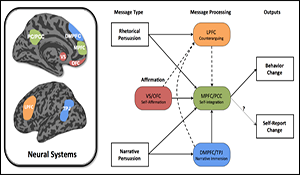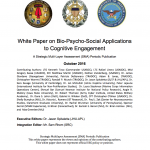Applying Bio-Psycho-Social to Cognitive Engagement

White Paper on Bio-Psycho-Social Applications to Cognitive Engagement.
Author | Editor: Spitaletta, J. (Johns Hopkins University Applied Physics Laboratory).
The recently released White Paper entitled “Assessing and Anticipating Threats to US Security Interests: A Bio-Psycho-Social Science Approach for Understanding the Emergence of and Mitigating Violence and Terrorism” that Giordano discusses in the succeeding section provided a scientific perspective on current operations. The current White Paper provides operational perspectives on that and other relevant sciences. Previous versions outlined WHAT scientific approaches might be relevant; this iteration focuses on HOW to operationalize it.
The underlying concept of this paper is how bio-psycho-social approaches to cognitive engagement, described in greater depth by DeGennaro, may be put to use to collect, analyze, and/or apply information to meet a tactical, operational, or strategic end. This White Paper will focus on the proverbial “rubber meets the road” approaches of behavioral operations in the human domain where the former is “the study of attributes of human behavior and cognition that impact the design, management, and improvement of operating systems, and the study of the interaction between such attributes and operating systems and processes” and the latter is “the presence, activities (including transactions both physical and virtual), culture, social structure/organization, networks and relationships, motivation, intent, vulnerabilities, and capabilities of humans (single or groups) across all domains of the operational environment (Space, Air, Maritime, Ground, and Cyber).” Information Operations (IO) doctrine defines the cognitive domain as the component of the information environment (IE) that encompasses the gray matter of those who transmit, receive, and act upon information. Cognitive operations such as information processing, perception, judgment, and decision- making are the most vital aspect of the IE. Cognition is influenced by individual and cultural beliefs, norms, vulnerabilities, motivations, emotions, experiences, morals, education, mental health, identities, and ideologies and thus requires research and analysis methods from the bio-psycho-social sciences to understand and manipulate. When, how, and most importantly why to apply that understanding to US advantage at the tactical, operational, and strategic level is the focus of this effort.
The volume is focused primary on Military Information Support Operations (MISO), formerly Psychological Operations (PSYOP) as it is the activity that can most benefit from (and reciprocally impact) cognitive engagement. However, IO core capabilities such as Military Deception (MILDEC) and Computer Network Operations (CNO) information related capabilities such as counterintelligence (CI) could also benefit from bio-psycho-social applications to cognitive engagement.
To paraphrase Sir Basil Henry Liddell Hart, targeting the mind of the enemy commander is more important than the bodies of his troops (Hart, 1967), that recommendation can be extended to all those, belligerents and combatants alike, who comprise the human domain. The contemporary operating environment is growing increasingly contentious, however, the vast majority of those contentions do not necessarily require the use of lethal force. Instead, nuanced understanding of the nature of conflict and the peoples engaged are required to remain competitive. Cognitive engagement entails understanding the individual nodes with the human domain as such and developing appropriate methods for interacting with them. This White Paper is meant not only to continue the dialogue between the academic and operational communities but also to explore more deeply how to apply knowledge gained through bio-psycho-social research to cognitive engagement.
Contributing Authors
Bar, S. (Samuel Neaman Institute for National Policy Research), Baroni, S. (National Intelligence University), Bliner, E. (ForecastFwd), Bumphus, S. (NIU), DeGennaro, P. (TRADOC), Gerrol, S. (SPARK Experience), Giordano, J. (Georgetown University), Greenlee, M. (National Intelligence University), Holmes, B. (National Intelligence University), Jonas, A. (TRADOC), LaFon, D. (DoD), Lejeune, P. (International Institute for Non-Proliferation Studies), Linera, R. (USASOC), Mallory, A. (Iowa State University), Martin, M. (USASOC), McCulloh, I. (Johns Hopkins University), Munch, R. (TRADOC), O’Brien, C. (USASOC), Savage, S. (University of Cambridge), Romero, V. (IST Research), Seese, G. (USASOC), Spitaletta, J. (Joint Staff/J7 & Johns Hopkins University/Applied Physics Laboratory), Steckman, L. (Marine Corps Information Operations Center), Thomson, R. (Army Cyber Institute, United States Military Academy), Tovo, K. (USASOC), Vanderberg, N. (USASOC), Whalen, G. (DoD), Worret, C. (TRADOC), Wurzman, R. (University of Pennsylvania), Zak, P. (Center for Neuroeconomics Studies, Claremont Graduate University)

Comments